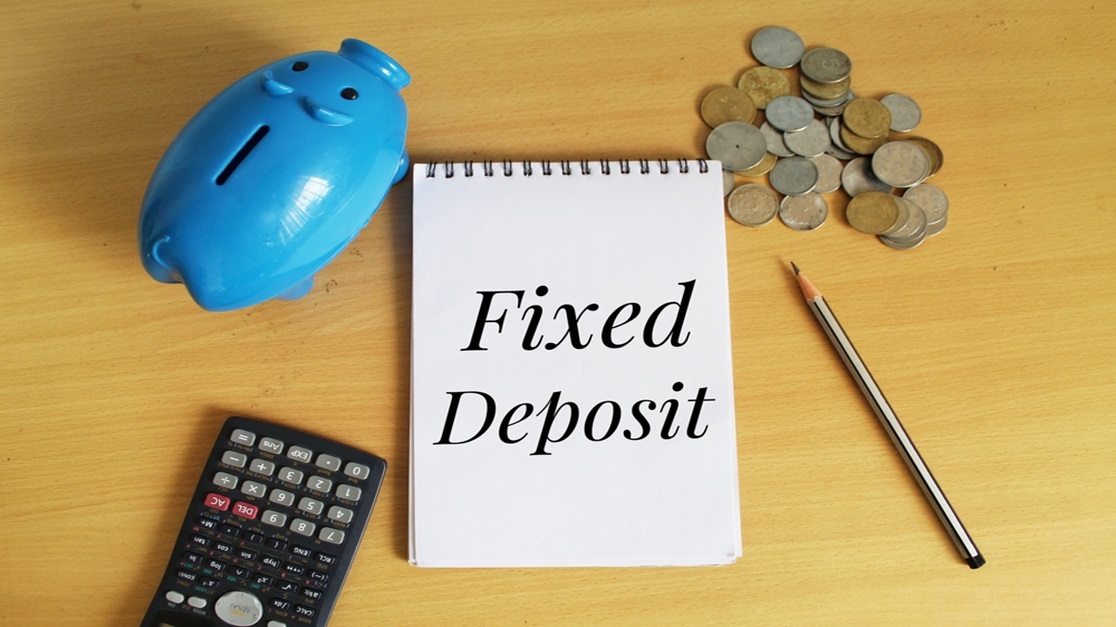Understanding Fixed Deposit Interest Rates
August 04, 2025

When you invest in Fixed Deposits (FDs), rest assured you will earn guaranteed returns. FD interest rates are higher than that of Savings Accounts, which helps you maximise your savings potential. But, how does FD rates work? Why banks increase or decrease FD interest rates?
In this blog, we have explored everything from how FD rates are set to tips for choosing the right tenure, and how to make the most of your investments.
What are Fixed Deposit Interest Rates?
Fixed deposit interest rates are the interest you earn on your fixed deposit account. The interest remains fixed throughout the tenure of your deposit. However, the interest pay-out pay differ depending on the type of deposit you select - cumulative FDs or non-cumulative FDs.
For cumulative FDs, the interest is paid out at the time of maturity, whereas non-cumulative FDs facilitate periodic interest pay-outs - monthly, quarterly or annually.
How is FD Interest Calculated?
FD interest can be calculated using two methods - the simple interest method and the compound interest method.
So, what's the difference between the two? With simple interest, the interest is earned only on the principal amount, whereas with compound interest, the interest is calculated both on the principal a amount and the interest accrued, leading to higher overall returns.
The formula for simple interest calculation is:
(P x R x T/100). where, P= Principal amount; R = Rate of interest per annum; T= No. of periods (in years).
The formula for compound interest calculation is:
A= P(1+r/n)^n*t, where, A is the maturity amount, P is the principal amount, r is the annual interest rate (expressed as a decimal), t is the tenure in years, n is the number of times interest is compounded per year.
However, manual calculations are time consuming and may leave room for errors. As a better alternative, use a Fixed Deposit ROI Calculator to check your maturity amount and the interest earned.
How is Fixed Deposit Maturity Amount Calculated?
We have used both methods so you can understand the impact of compounding on your returns.
With simple interest method, here's how your returns would look like:
Maturity Amount = 50,000 + (50,000 x 6 x 5)/100
Maturity Amount = 50,000 + 15,000
Maturity Amount = ₹65,000.
Now, let's understand this with the compound interest method:
The formula is A= P(1+r/n)^n*t.
Let's say you deposit ₹50,000 at an interest rate of 6% per annum for 5 years, compounded annually.
A=50,000×(1+0.06/1)1×5=₹66,910.
So, at maturity, you will receive ₹66,910.
The examples show how your money grows via compounding.
Disclaimer: The above calculation is for informational and educational purposes only. Ujjivan Small Finance Bank does not take any responsibility regarding the accuracy of the information provided.
How to Select the Right Fixed Deposit Interest Rate?
1. Consider Tenures and Financial Goals
It's a bit tricky. For shorter tenures, you may get higher rates. For example, Ujjivan SFB offers 7.45% p.a. (data as on 05 Aug 2025) for an FD tenure of 24 months. For longer longer tenures, the interest rate could be lower or vice versa. So, which tenure should you go for?
Well, it depends on your financial goals. If you want to buy a two-wheeler in one year, you can open a short-term FD and grow your initial deposit via higher interest rates. Upon maturity, you can withdraw the amount and use it to fund your two-wheeler.
But when it comes to long-term growth, it's important to extend your investment horizon. Even if the rates are lower, you would earn more if you stay invested for the long term - thanks to the power of compounding. Kindly note that we're not considering post tax returns.
Key Factors Influencing FD Rates
When considering fixed deposits (FDs) as an investment, several key factors play a crucial role in determining the interest rates you receive. Let's explore these factors:
- Economic Conditions: Generally, if inflation is high, FD rates tend to rise.
- Monetary Policies: RBI’s decisions on repo rates may directly affect bank FD rates.
- Bank-Specific Factors: Each bank has its liquidity needs which can influence the interest rates offered.
- Duration: Typically, the longer the duration of the FD, the higher the interest you would earn .
Comparison of Tenures and FD Rates
Here are the interest rates for domestic fixed deposits at Ujjivan Small Finance Bank:
| Tenure | Interest Rate |
|---|---|
| 7 days to 29 days | 3.50% |
| 30 days to 89 days | 4.15% |
| 90 days to 179 days | 4.65% |
| 180 days | 6.00% |
| 6 months to < 12 months | 5.50% |
| 12 months to < 24 months | 7.25% |
| 24 months | 7.45% |
| 24 months 1 day to 990 days | 7.25% |
| 991 days to 60 months | 7.20% |
| 60 months 1 day to 120 months | 6.50% |
| Additional Interest Rate for Senior Citizens | 0.50% |
Data as on 05th Aug 2025. Interest Rates are subject to periodic changes and the applicable interest rates will be given based on the date and time of receipt of the funds by the Bank.
Final Thoughts
Choosing where and how to secure your savings is crucial in navigating through economic uncertainties and achieving financial goals efficiently. Selecting the right fixed deposit interest rates can significantly impact your financial stability and growth.
Looking to grow your savings faster? Ujjivan SFB offers a wide range of fixed deposit products. Select the FD of your choice and take a step forward to your financial goals. Alternatively, you can browse through Ujjivan SFB product suite - our wide range of financial products are designed to make your financial life better.
Disclaimer:
The contents herein are only for informational purposes and generic in nature. The content does not amount to an offer, invitation or solicitation of any kind to buy or sell, and are not intended to create any legal rights or obligations. This information is subject to updation, completion, amendment and verification without notice. The contents herein are also subject to other product-specific terms and conditions, as well as any applicable third-party terms and conditions, for which Ujjivan Small Finance Bank assumes no responsibility or liability.
Nothing contained herein is intended to constitute financial, investment, legal, tax, or any other professional advice or opinion. Please obtain professional advice before making investment or any other decisions. Any investment decisions that may be made by the you shall be at your own sole discretion, independent analysis and evaluation of the risks involved. The use of any information set out in this document is entirely at the user’s own risk. Ujjivan Small Finance Bank Limited makes no representation or warranty, express or implied, as to the accuracy and completeness for any information herein. The Bank disclaims any and all liability for any loss or damage (direct, indirect, consequential, or otherwise) incurred by you due to use of or due to investment, product application decisions made by you on the basis of the contents herein. While the information is prepared in good faith from sources deemed reliable (including public sources), the Bank disclaims any liability with respect to accuracy of information or any error or omission or any loss or damage incurred by anyone in reliance on the contents herein, in any manner whatsoever.
To know more about Ujjivan Small Finance Bank Products Visit:"https://www.ujjivansfb.in"
All intellectual property rights, including copyrights, trademarks, and other proprietary rights, pertaining to the content and materials displayed herein, belong
to Ujjivan Small Finance Bank Limited or its licensors. Unauthorised use or misuse of any intellectual property, or other content displayed herein is strictly prohibited and the same is not intended for distribution to, or use by, any person in any jurisdiction where such distribution or use would (by reason of that person’s nationality, residence or otherwise) be contrary to law or registration or would subject Ujjivan Small Finance Bank Limited or its affiliates to any licensing or registration requirements.
FAQs
1. What determines FD rates?
Different factors including RBI policies, bank's internal policy, and economic conditions may influence fixed deposit interest rates.
2. Can I break my FD prematurely?
Yes, you can, but doing so may incur penalties that can affect your final return due to reduced interest rates.
3. Can I receive monthly interest on the fixed deposit?
Yes, in the case of non-cumulative fixed deposits, you can receive monthly interest. The interest is paid out periodically - monthly, quarterly or annually.
Latest Blogs

Capital Adequacy Ratio (CAR): Meaning, Formula, and RBI Norms
Banks run on trust — but trust alone cannot guarantee stability. A sudden surge in bad loans or a market shock can quickly weaken even the largest institutions.

ITR Filing Penalties: What You’ll Pay in Fees, Interest, and Compliance Costs
The Income Tax Department extended the ITR filing deadline for FY 2024–25 to September 15, 2025, giving taxpayers a second chance after the original due date lapsed.

Marginal Tax Relief for FY 2025-26: How India’s New Rule Helps You Save Income Tax
The Union Budget 2025 introduced a major income tax relief for the middle class – making annual incomes up to ₹12 lakh completely tax-free* under the new regime.

APK Fraud: How One Wrong Download Could Empty Your Bank Account
Picture this. You’re sipping your evening tea when your phone rings.

Gold Loan LTV Ratio Explained (75% to 85%): What It Means for Borrowers
In June 2025, the Reserve Bank of India (RBI) introduced a significant relaxation for gold loan borrowers: the maximum Loan-to-Value (LTV) ratio for loans below ₹2.5 lakh was raised to 85%, up from the long-standing cap of 75%. Loans between ₹2.5 lakh and ₹5 lakh can now go up to 80%, while loans above ₹5 lakh continue under the 75% ceiling.





